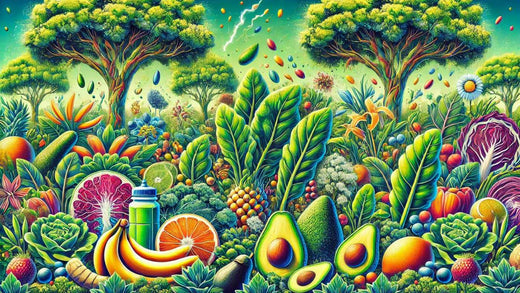How to Get Electrolytes: Top Foods & Drinks That Help

Electrolytes aren't just buzzwords tossed around by athletes and health enthusiasts—they are crucial for maintaining a balanced, energetic life.
Whether you're a marathon runner or a busy parent, understanding how to effectively obtain electrolytes through your diet can transform your health.
This guide will walk you through the best natural sources and methods to replenish these vital minerals.
Understanding Electrolytes and Their Importance
Electrolytes, such as sodium, potassium, calcium, and magnesium, are not just chemicals in your body; they are the spark plugs of life.
They help repair injured tissue, balance blood acidity, hydrate the body, and control nerve and muscle function (1).
Let us examine how these charged particles maintain optimal health.
Top Foods High in Electrolytes
Imagine your body as a garden that needs watering—fruits and vegetables are the natural rain (2).
Here are some top picks that are brimming with essential electrolytes:
- Spinach and kale: Laden with potassium, magnesium, and calcium.
- Bananas: A quick source of potassium, perfect for a pre-workout snack.
- Avocados are high in potassium and magnesium, like nature's electrolyte reservoir.
Nuts and Seeds for Electrolyte Balance
Nuts and seeds are the steady drumbeat that maintains the rhythm of your bodily functions in the orchestra.
They not only provide healthy fats but are also rich sources of magnesium and potassium.
Almonds, peanuts, and pumpkin seeds are your go-to munchies for a nutrient-packed treat.
Natural Drinks to Boost Your Electrolytes
When you sweat it out at the gym or need a hydration boost, natural drinks can be your best friend:
- Coconut water: It's nature's sports drink without the added sugars.
- Milk: A glass can offer a good sodium, calcium, and potassium mix.
- Watermelon water: Refreshing and rich in potassium, it's perfect for hydration.

Homemade Electrolyte Drinks
Crafting your electrolyte drink can be both fun and beneficial.
Blend some orange juice, lemon juice, coconut water, a pinch of salt, and a tablespoon of honey to create a hydrating mix that keeps electrolyte levels topped up (3).
How to Replenish Electrolytes Quickly and Naturally
Sometimes, you need a quick fix, especially after intense activities or sudden dehydration.
A smoothie with banana, kale, and a pinch of salt can quickly restore your electrolyte balance.
Long-Term Electrolyte Management
Integrate electrolyte-rich foods into your diet for sustainable health (4).
Plan meals that incorporate these elements naturally, ensuring your tank is always full.
The Role of Diet in Electrolyte Balance
Maintaining electrolyte balance through diet isn't just about eating specific foods; it's about embracing a lifestyle that values natural, unprocessed foods that are inherently rich in these crucial minerals.

When to Consider Supplements
While natural sources are ideal, sometimes, life's pace demands a quicker solution.
In such cases, supplements can be a practical way to maintain electrolyte balance.
Explore Wild Foods' range of natural supplements to find your fit.
Final Thoughts
Like balancing the ecosystem in nature, maintaining the right electrolyte balance in your body is about integrating natural sources into your daily routine.
Ensure you are hydrated, eat whole meals, and listen to your body's cues as you embark on this adventure.
⚡ Feel the Energy! Boost your workout with our all-natural Wild Foods Himalayan Salt that boosts Electrolytes!
FAQs
How do you replenish electrolytes quickly?
Quickly blend a banana with spinach and a pinch of salt for a rapid recovery smoothie.
How can I get electrolytes naturally?
Eat a balanced diet that includes a variety of fruits, vegetables, nuts, and seeds.
What can I drink to increase my electrolytes?
Sip coconut water or milk, or drink your hydration as described above.
What foods are high in electrolytes?
Avocado, leafy greens, nuts, and seeds are your best bets.
How do you replace electrolytes quickly?
For immediate replenishment, consider a quick electrolyte drink post-exercise.
Related Studies
1. Title: Electrolyte Intake and Major Food Sources of Sodium, Potassium, Calcium and Magnesium
This study by Nutrients analyzes dietary intake and major food sources of key electrolytes, highlighting their critical roles in muscle function and nerve transmission. It revealed significant deficiencies in potassium and magnesium among participants.
Link: https://www.ncbi.nlm.nih.gov/pmc/articles/PMC7400604/
2. Title: Electrolyte Intake and Major Food Sources of Sodium, Potassium, Calcium and Magnesium
The research by the Nutrients identifies dietary patterns and food sources contributing to sodium, potassium, calcium, and magnesium intake, emphasizing the importance of fruits and vegetables like spinach and bananas in achieving adequate electrolyte levels.
Link: https://www.ncbi.nlm.nih.gov/pmc/articles/PMC7400604/
3. Title: Sip Smart: Homemade Electrolyte Drink Recipe
This article guides you on replacing caffeine with homemade electrolyte drinks to boost hydration and energy levels without adverse effects, covering caffeine impacts, recommended intakes, and easy recipes for making electrolyte water.
Link: https://extension.usu.edu/createbetterhealth/blog/electrolytedrinkrecipe
4. Title: An Examination of Dietary Electrolyte Intake among Adults Living in Arkansas: Implications for Practice
This review by the American Journal of the Academy of Nutrition and Dietetics discusses the long-term health benefits of a diet high in electrolytes, linking consistent intake to improved cardiovascular health and reduced risk of chronic diseases.
Link: https://www.jandonline.org/article/S2212-2672(13)00830-7/abstract

